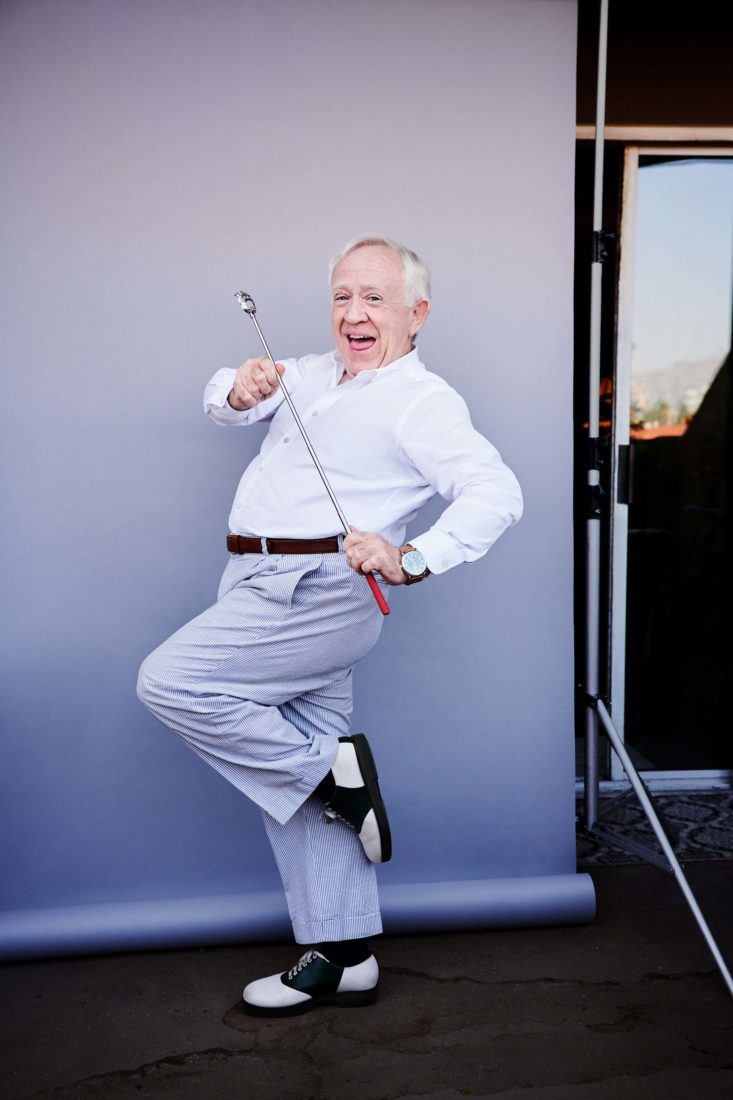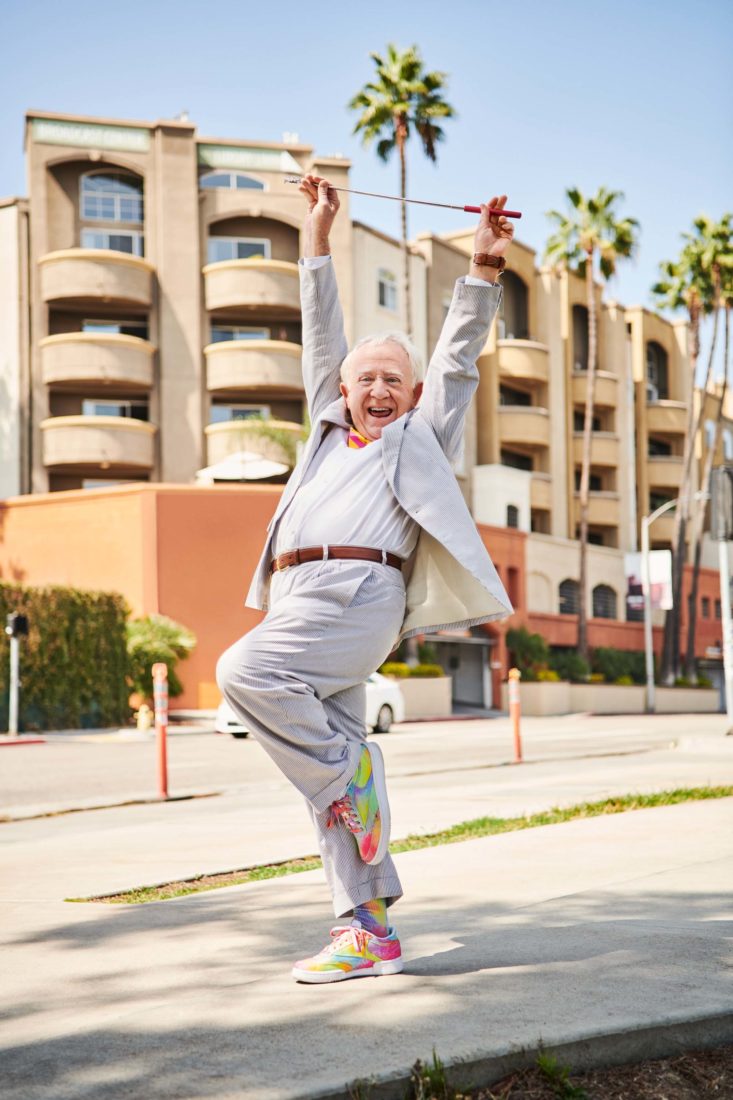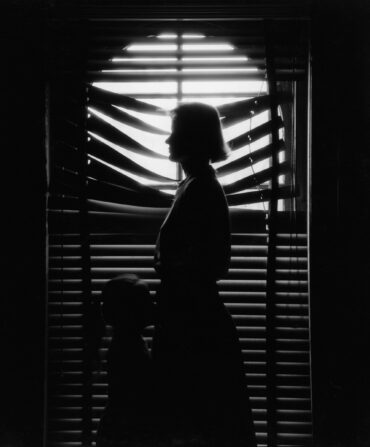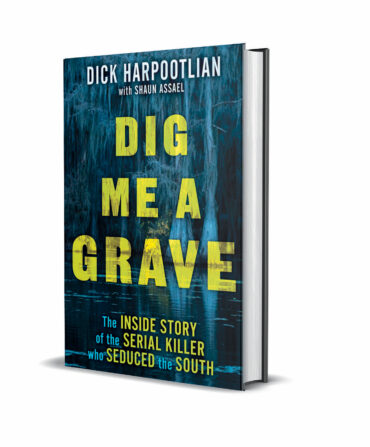Standing four feet eleven, with a drawl as thick as summer honey and a wit as sharp as cucumber vine, the Tennessee-born writer, actor, and comedian Leslie Jordan is the people’s Truman Capote. A seasoned stage performer and raconteur famous for his zingers—no more so than during his Emmy-winning run as Beverley Leslie, Karen Walker’s prickly nemesis on Will & Grace—the sixty-five-year-old Jordan has recently stumbled into new renown thanks to a series of viral Instagram posts, many filmed while social distancing in his hometown of Chattanooga. His droll, Southern-camp takes garnered him more than five million followers in record time, leading to a book deal (his essay collection How Y’all Doing? comes out in the spring) and splashy roles in several upcoming film and TV projects. “I just got off the phone with Lee Daniels. We’re doing a movie about Billie Holiday!” Jordan says excitedly. “My new series, Call Me Kat, with Swoosie Kurtz and Cheyenne Jackson, is starting up. I’m so popular now I can’t get out the door. I’m like Lady Gaga! I mean, at my age, how can you ask for more?”

While staying home, you posted two Instagram videos a day for eighty days.
And all of a sudden, I have people stopping me on the street! They tell me how much I have helped them during all this. They wanna hug me. People knew me from my TV roles, but I don’t think they knew me. People now know me for me.
How does that make you feel?
I’m proud I was able to help people through a really difficult time using nothing more than comedy, nothing more than just being myself. My younger sisters are identical twins, and it was always the two of them—then me. I just played on my own. I can spend days upon days alone.

When did you realize you were funny?
One day, I came out of Sunday school—I was about seven. I was raised Southern Baptist. I’ve been baptized fourteen times—it just never took. [Laughs.] But I came out, stomped my foot, and told my daddy, “I’m not goin’ back. They laugh at me, that’s all they do, they just laugh at me.” And my daddy said, “You’ve been blessed, you’ve been given a gift, Leslie.” And he made me promise I’d never hide my light under a bushel, but always let it shine.
Did you use humor as a coping device?
Oh yes. I honed my comedy skills to keep the bullies at bay. You learn to be funny. I have to watch that as an adult, because it’s a defense mechanism. If I don’t want you to get close to me, I’ll get you to laugh, and be tellin’ stories. I have to say to myself, Calm down, Leslie’s enough, you don’t have to tell story after story.

Where do you think the peculiar Southern sense of humor comes from?
We gather a lot in the South. That’s the basis of it all. Our humor is not really jokes, it’s character driven, it’s storytelling. It’s “You’re never gonna believe what happened and Lord, Lord, Lord and then she came in here and lo lo lo and la la la.” No segue or anything. [Laughs.] You just launch.
What tethers natives to the South? We’re always going back.
Our roots just call us. The last time I was back in Tennessee, we were hunkered down. My mother has a yard and a porch swing where I could sit outside. I’m lucky I have a mother still who loves to cook for me. The best beef stew you have ever tasted, with thin, tiny cornbread that she fries and you crumble in your bowl. In the summertime, my mother will make a big pot of pinto beans with a hunk of fatback in it.
What’s the most Southern thing about you?
Probably my accent. I have two accents. I have Southern, and I have gay. I open my mouth and fifty yards of purple chiffon come rattling out. When I first got to Hollywood, I tried to get rid of my Southern accent and I couldn’t. I remember they hired me to play this space barterer on Star Trek: Voyager. They put me in forty prosthetic pieces, fake contact lenses, fake teeth, a five-hour makeup job, and I paraded on the set, delivered my first line, and they just fell on the floor. The director said, “You have to get [your character] north of the Mason-Dixon.” [Laughs.] Then they hired a linguist and she got ugly. She said, “Mr. Jordan, feather doesn’t have four syllables.” Yes, it does: fay-a-ther-er.

When were you able to fully embrace who you are?
It was such a journey. I was on Caroline in the City, newly sober—I’m in recovery for twenty-three years from drugs and alcohol. I called my spiritual adviser and asked his advice. “Where do I fit in here?” And he said, “I think that what you should do, Leslie, is show up to be of loving service.” And I thought, This is a bunch of pabulum. [Laughs.] But I started applying that. And directors use me over and over again. Because I show up, I’m on time, I’m of service. When I first got to Hollywood, I wanted to be a gay Hugh Hefner. I wanted to have a house in the Hollywood Hills with seven beautiful boys, like Hugh Hefner used to have all those blondes living with him. I wanted to give brunches where everybody’d come up to my house. The other day I thought, If that were my life, I’d kill myself. [Laughs.]
What advice would you give to other people finding their way?
When I first got into recovery, someone I was talkin’ to said, “Leslie, you need to write this, and put it on the wall: What you think of me is none of my business.” I said, “What do you mean? We’re people pleasers in this business. I have to worry about not only you, but the neighbors, everybody at the church.” But that was probably the best advice I ever got. What you think of me is none of my business. I can honestly say that at sixty-five years old, I am one hundred percent comfortable with who I am, what I am. And how that happened is just a lot of years and a lot of work. I finally decided I’m a marketable package as is, four foot eleven and such a Southern character.

You’ve always delivered joy.
I was born with a large capacity for happiness. Also, I was raised right, I was brought up right. But I work at it too. Is there meanness and ugliness and homophobia in the world? Absolutely. But you gotta remember, people are out there just doing the best they can with the light they have to see with, honey.








